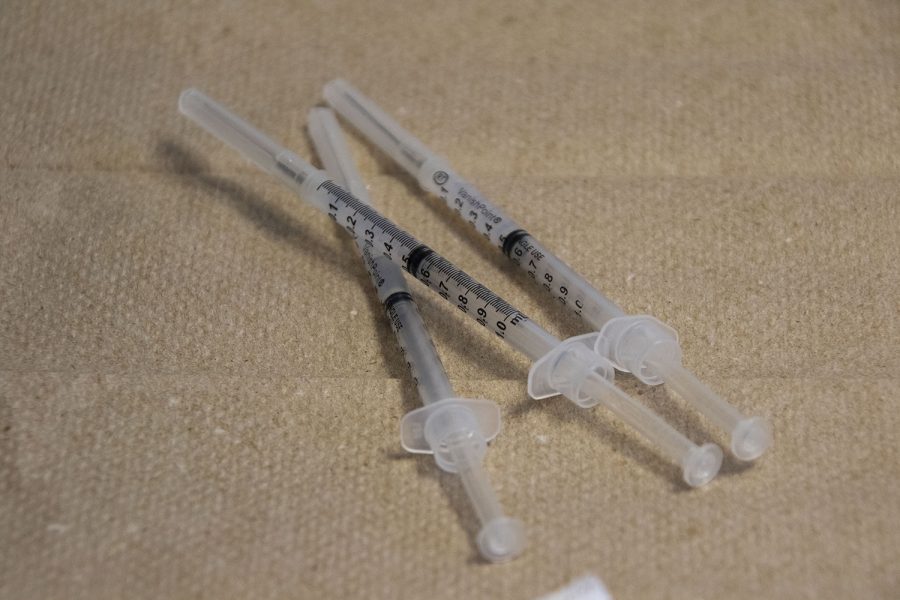Opinion | COVID-19 increases the need for, not prevents, scientific research
My experience with the UI department of psychological and brain science taught me how research can still be conducted and the good it can do for people during the pandemic.
UI students given first round of vaccinations on Thursday, Jan 28, 2021. Syringes wait to be used. Each has the Moderna Covid-19 vaccine in it.
March 5, 2021
I started writing my undergraduate thesis paper for my lab less than a foot from my bed in my parents’ new house.
Beforehand, my thesis adviser and I talked about how we were going to work on my honors project remotely. While I was worried, it was easier than I thought because we used an online program called Qualtrics.
This experience has shown me the importance of science during the COVID-19 pandemic.
Scientists may have had to adjust during the pandemic, but it has not stopped the need for and ability to conduct important research.
At a meeting last week, the judgment and decision-making lab I work in announced one of their papers got accepted to be published in a scientific journal. This highlights the importance of research, but more importantly, shows COVID-19 is not preventing scientists from making progress. Meredith Nastruz, a University of Iowa senior, said she has continued working with computer programs.
“I’m doing the same research I would have been doing but alone in my room and have meetings with people virtually once a week,” Nastruz said.
Besides Qualtrics, there are plenty of other ways for scientists to run tests. The judgment decision-making lab I work for uses mturk — a program that makes it easy for tasks to be distributed virtually. Nastruz said scientists in-person research is still possible with COVID-19 guidelines like social distancing and wearing masks.
It goes without saying that a global pandemic killing hundreds of thousands of Americans requires robust research.
Researchers at the University of Iowa and Iowa State University have partnered to create a COVID-19 vaccine, which can be administered through a nasal spray. This wouldn’t have been possible without the scientific process and research.
Nastruz said scientific research literacy is important now because more people are turning to it for information about topics like vaccines.
“I feel like more non-science people are reading research but the impact of it is still the same,” Nastruz said.
The pandemic has also increased the need to study what I want to research professionally which is mental health — one facet of health that has been dramatically challenged during the pandemic.
The Centers for Disease Control and Prevention found by late July, 13 percent of U.S. adults had increased or started consuming alcohol, and 11 percent considered suicide. Reports from the Kaiser Family Foundation found worry increased from 32 to 53 percent from March until July. Anxiety and depression also increased by 11 percent.
Considering these added stressors from a pandemic, it is now more important than ever for scientists to do research about mental health.
In the ADHD and development lab I work in, we are learning about different diagnostic measures clinicians use. Soon, we are going to start doing Zoom diagnostic interviews. By continuing to work as a lab, we might uncover mental health problems in someone that otherwise might have gone unnoticed until it was too late.
I’m thankful for a thesis adviser who was more than willing to work on my project remotely and psychology labs which continue doing research to the greatest extent they can. I am thankful for weekly lab assignments and readings which gave me the skills to talk about and conduct scientific research.
Einstein wouldn’t have let a pandemic stop him, and neither should any modern scientists. Whether it be a COVID-19 vaccine or a cure for depression, scientific research can save lives during the pandemic. We must keep pushing for progress.
Columns reflect the opinions of the authors and are not necessarily those of the Editorial Board, The Daily Iowan, or other organizations in which the author may be involved.




